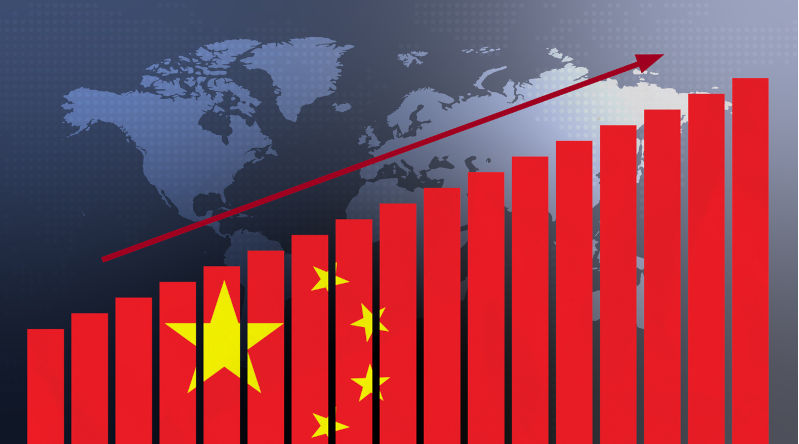Western decline: Denial and anger at China’s vitality
June 7, 2024
In her work, ‘On Death and Dying’ Elisabeth Kübler-Ross wrote of the stages one goes through on being told one is dying. She called these ‘Five Stages of Grief,’ of adjusting to reality: denial, anger, bargaining, depression and acceptance.
Such is descriptive of the attitude of much of the West to the rapidly changing world order, the dying of its preeminence. That order, wherein it was held to be the natural order for the West to dominate, held for around 250 years, sufficient to make it easy to forget that this has not some natural order of things through history. For most of the past 2,000 years wealth and power actually lay in the East, primarily with China and India.
Western dominance began with the first Portuguese caravels crossing world oceans establishing a mercantile economic order in which wealth flowed back to the home ports. Portuguese colonial power was followed by the Spanish, Dutch, French and most powerfully the English. Having grown in a time when half the globe was coloured red that is my lived experience. The prowess of England in conquering the world was profound. A nation with just 11 million in 1820 was able to hold sway, directly or indirectly, over China and India, having populations respectively of 390 million and 210 million.
Of course that power was transferred from England to its Anglo offspring the United States following WWII. So dominant was the US following that conflict, which drained Europe of its strength, with a population of just 6% of the global aggregate it possessed some 40% of global wealth.
Essentially the world was run as a US corporation, except for those nations behind the ‘Iron Curtain.’ When those nations began to implode from the late 1980s global dominance of the US seemed complete. Francis Fukuyama trumpeted that with US unipolar dominance, we had reached ‘the end of history.’
Many of us found it hard to disagree. US hegemony seemed complete. A decade later came 9/11 and the world announced itself as, ‘we are all American.’ Long term US and Western ascendency seemed guaranteed.
Then it started to go bottom up. First, the illegal invasion of Iraq, followed by a 20 year ‘quagmire’ in Afghanistan. Domestically U.S. politics sunk from a low of George W. Bush, to something even lower, the open philander Donald J. Trump versus ‘give me a war’ Joe Biden.
It has not only been military and economic ascendency being lost, but more importantly, moral authority. Though the US continues to speak of itself as ‘the exceptional nation’ leading a benevolent ‘rules based international order,’ such is increasingly being shown to be nought but hypocritical cant. Recent events in Gaza, with the criminal US acquiesce and support, has merely completed the process. Alone, left to defend the US and its standing in the world, are an increasingly smaller number of Western nations, themselves losing moral suasion by their so acting.
It may well have been possible for the West to weather all this, but for the rise of another, China, rapidly asserting its position in the world after a 200 year hiatus, including, ‘a century of humiliation,’ at the hands of the West. China presents as a civilisation bristling with vitality, energy and confidence. Its citizens have seen their incomes multiply 40-fold in the past 40 years as their economy has been transformed from one backward and marginal, to one on Purchasing Power Parity terms being the global leader.
Faced with its decline the West seems caught between Kübler-Ross’ first two stages; denial and anger.
Thus, Western media on every world issue selectively quotes western opinion as though that were the only opinion of import, reporting often becoming an echo-chamber, both of reinforcement and denial. While this may be conscious choice, it also is a result of learned habit, an unconscious conditioning, as automatic response to events.
Denial also takes another form as repetitive rejection of reality. Thus we are repeatedly told, the Chinese economy, growing at >5% p.a., is about to implode. Objective analysis is lost as facts (in this case the growth rates of different economies) are bracketed as not existing, nor permitted to get in the way of the accepted, hoped for, projection.
Where there is recognition of the reality, it usually comes as harsh shock, anger often the reaction. Reality is then met by those not ‘us’ being ‘othered,’ presented as threat.
This stage of anger is the most dangerous, anger having at its root, irrationality. As the Thucydides Trap reminds us, there is great danger in an established power, under threat, lashing out in anger at that ascending. The current climate of US politics makes that a real possibility. Given the clock of the atomic scientists now at 90 seconds to midnight, awful visions of the apocalypse are conjured.
In face of such, hopefully we survive to reach the third stage, bargaining. Though in the Kübler-Ross schema that is viewed as negative, in international geo-politics it is a positive, an acknowledgement of reality, the laying aside of anger, with a preparedness, using clear headed analysis, to enter into diplomacy, to ‘unother’ the other, recognising differences, negotiate and find common interest.

